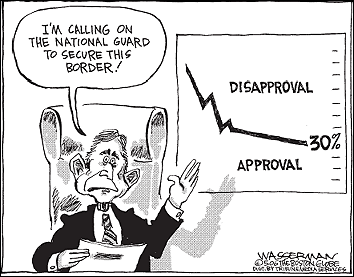Bush and IT
Regardless of whether or not the controversial National Security Agency data mining program directly threatens the Fourth Amendment's "right of the people to be secure in their persons, houses, papers, and effects, against unreasonable searches and seizures," it most certainly represents an astounding technological marvel from an IT perspective.
Think about the underlying information-trolling technology that enables a database program to profile virtually every American's phone conversations,
 giving government instant access to detailed knowledge of the numbers, and thus indirectly the identities, of whomever we phone; when and for how long; and what other calls the person phoned has made or received. Even if one trusts the president's promise not to connect all the dots to the degree the technology permits, the act of collecting all those dots in a form that permits their complete connection is a realization of the Big Brother society that George Orwell described in his novel "1984."
giving government instant access to detailed knowledge of the numbers, and thus indirectly the identities, of whomever we phone; when and for how long; and what other calls the person phoned has made or received. Even if one trusts the president's promise not to connect all the dots to the degree the technology permits, the act of collecting all those dots in a form that permits their complete connection is a realization of the Big Brother society that George Orwell described in his novel "1984."Although the Bush administration may have successfully helped propel forward IT's technological innovativeness, the same cannot be said about the IT industry in general.
 Unfortunately, the health and well-being of IT departments have pretty much followed the same trajectory as Bush's approval ratings.
Unfortunately, the health and well-being of IT departments have pretty much followed the same trajectory as Bush's approval ratings. Prior to Bush's presidency, IT was almost impervious to market swings in the economy. The staggering nonstop growth of IT stocks like Microsoft, Cisco, and Intel, even after severe market crashes like in October 1987, was cited as tangible proof of America's never-ending ingenuity. But none of these stocks, nor those for hundreds of other IT companies, have ever come close to fully rebounding from the triple whammy of the Y2K debacle, the Internet bubble, and the 9/11 terrorist attacks.
Other parallels between IT and the Bush administration include loss of faith in the future and gross managerial incompetence.

According to Gartner, IT is now a "non-growth industry" with spending lagging behind general economic growth. Today's conventional wisdom is that there are no compelling reasons for vigorous investment in IT. In other words, businesses have lost faith in their ability to generate returns from technology investments. They have concluded that IT, nowadays, is just a commodity. So, when it comes to IT, there's no longer any tangible value to be achieved by striving for excellence or being innovative. How myopic!
The mistake many business leaders are making is believing that computer networks are pretty much plug-and-play and that industry standards have eliminated the need for them to have to do much systems integration any longer. The reality is that the opportunity to innovate through IT has never been greater. Doing so, however, requires significant paradigm shifts on the part of business management. The loss of faith must be restored. Incompetence must be pushed aside. Business leaders must be willing to nurture and foster innovation.
For an example of software innovation, look at how Boston's new TD Banknorth Garden was sold out for the final 14 Boston Celtics basketball games despite the team's woeful performance on the court (see "Sold out at the Garden"). A tiny Cambridge, Mass. software firm called StratBridge developed a system which enabled the Celtics' executives to see which tickets were not sold, act on the information by designing promotions to sell them, and watch the results live to make sure their promotions were working. This single IT-based innovation is probably going to revolutionize ticket-selling at sporting events as much as frequent flier programs affected the airlines business a generation back. All that's needed is a combination of out-of-the-box thinking and the courage to invest.
 Site Feed
Site Feed

1 Comments:
Cynical me! Somehow I wonder if the massive information-trolling database could have more to do with the Bush administration's attempts to track down people who leak stories to the media than it does with catching terrorists.
Post a Comment
<< Home